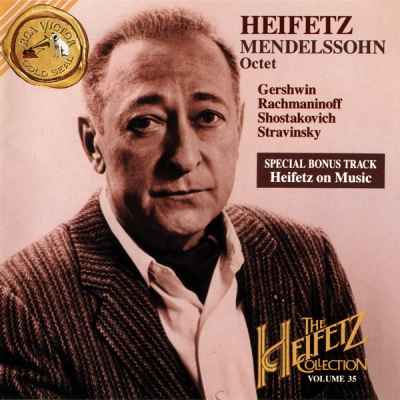
The Heifetz Collection, Volume 35 - Gershwin, Rachmaninoff, Shostakovich, Stravinsky
Who would think of such a collection of diverse musical styles and sonic structures as in this program? Probably Jascha Heifetz. Which isn't to imply that he selected it, but the complexity of his personality endowed him with a capacity for dealing the unexpected. Perhaps this is a divine characteristic of all great artists—to be unpredictable. Clearly their performances bear this indelible stamp as do their unconscious attitudes toward "normal" personal behavior. So a tribute to Heifetz's genius for the surprising is carried in this program of his own recorded performances. I think he would forgive the oblique reference to one of the selections by calling this a "delicious divertimento." It samples almost 25 years of his recording history and represents him as soloist, collaborator, arranger, and even as commentator (a role he very seldom played). It also brings together composers of his heritage and his adopted country: Russia and America. His passion for chamber music is expressed with the 16-year-old-Mendelssohn masterpiece and a mature Ernst Toch Divertimento. (Heifetz wanted the initial release of the Toch work, which lasts barely over 7 minutes, to occupy solely one side of an LP to emphasize his evaluation of its compositional importance. As a constant loser in Ping-Pong or gin rummy with him, I was amazed to win that argument!) Next to Mendelssohn's E Minor Concerto, Heifetz loved and respected his chamber music, and the Octet was a pivotal work in the first Heifetz-Piatigorsky Concerts series. How he did enjoy playing chamber music! It occupied his major attention after his 50th year (the age at which his father had advised him years earlier that he should retire "while you're still on top"—fortunately, he always allowed his own instincts to guide his decisions). Somehow his maturity sought the intimate musical communication provided by a few instruments integrally linked, and he reacted to his later years of private and public exhibitions like a hooked junkie! The attention to the morceaux that comprise much of this program expresses his contention that Oscar Wilde was right: "In life there is really no great or small thing. All things are of equal value and equal size. " Heifetz endowed the preparation, performance and recording of these short works with the same refinement and nobility that he devoted to a concerto. He sings a Rachmaninoff song or rocks a Stravinsky cradle, dances to a Shostakovich tune and gives a nod to his Americana pride with Bennett and Shulman—all with the same commitment that he applied to the humanity of the Brahms Concerto and the super-humanity of the Beethoven. In connection with his television special made in 1970, he agreed to record some candid remarks on various subjects—some in the garden of his Beverly Hills house and some near the beach at his Malibu Colony retreat. After elaborate editing of several miles of tape, he agreed to the comments heard here. Preserving his privacy, he allowed no hint of his profound absorption with his art or the depth of his artistic instincts. As fascinated as he was with the words of the English language (and his love of puns—his favorite invention: kumquat may!), his innate shyness invariably closed him off. It solved his problem in one instance I observed: an effusive back-stage visitor after one of his recitals pleaded, "How can I possibly tell you how much I enjoyed your performance?" He answered her question: "In English," and he wasn't trying to be funny. Hearing his voice as he expresses ideas about coordination, discipline, the ocean, his electric car puts one in touch with the human being behind superhuman accomplishments. To close this program, I've selected one work he often used for that purpose— announcing the encore in a conversational tone that at once disclosed the selection and suggested some philosophical tenet. He knew nothing happens in this world unless you try to make it so. And he worked hard for everything he achieved. But he tempered his awareness of his success with a considerable measure of suspicion that he had to work harder to keep it, because "It Ain't..." —John Pfeiffer
